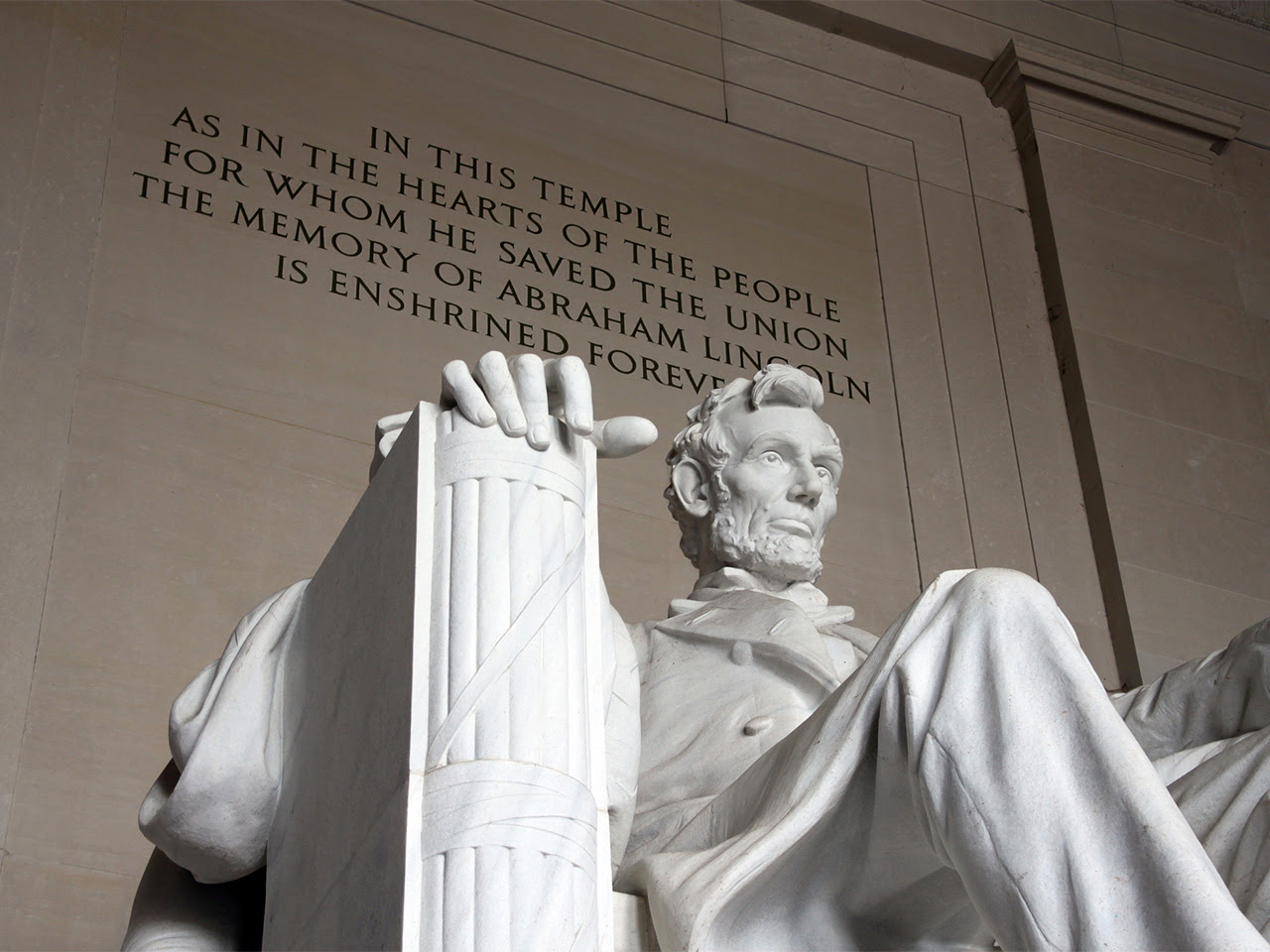Most Americans find it hard to reconcile that with everything else that we’ve learned about Lincoln. But in fact there’s a long train of abuses across the Lincoln administration, with ample documentation that’s always been available — just ignored. A good place to start is John A. Marshall’s American Bastile: A History of the Illegal Arrests and Imprisonment of American Citizens in the Northern and Border States on Account of Their Political Opinions During the Late Civil War (Philadelphia 1883).
Then there are the private letters, diaries, and memoirs that relate how the Lincoln administration posted armed troops at the polling places across the North, ready to arrest anybody who picked up a Democrat ballot. How Lincoln soldiers kicked in the doors of opposition candidates at midnight and dragged them away to military prisons a thousand miles away, without charge or habeas corpus, leaving Republicans to run unopposed. How they smashed the presses of opposition — or even just accurate — newspapers. Posted armed guards in churches to ensure that only the sermons written by the Secretary of War were proclaimed from the pulpit — and pistol whipped any clergyman who strayed, dragging him bloody through the congregation and off to those same distant prisons.
Well, even the standard histories of the time tell how the administration cut off the South’s trade with all parts of the world, and declared themselves invested with power to legislate in all cases whatsoever. How they affected to render the military independent of and superior to the civil power, keeping among Americans, North and South, standing armies, quartering large bodies of armed troops in people’s houses, protecting soldiers from punishment even for murder while depriving citizens of the benefits of trial by jury — took away our charters, abolished our most valuable laws, and altered fundamentally the forms of our governments — plundered our seas, ravaged our coasts, burnt our towns, and destroyed the lives of our people — in short, how the Lincoln administration combined with others to subject us to a jurisdiction foreign to our Constitution, and unacknowledged by our laws, running through practically the whole list of grievances in the Declaration of Independence four score and seven years before.
Best documented and most outrageous, there’s the overlooked case of Clement Vallandigham, sitting Representative of Ohio, arrested, imprisoned, tried by a military tribunal on vacant charges and transported contrary to the First Amendment and Art. I Sec. 6 (“The Senators and Representatives shall … be privileged from Arrest during their Attendance at the Session of their respective Houses, and … for any Speech or Debate in either House, they shall not be questioned in any other Place”, you know). But his was only one of thousands of such cases — all of them in the North, where the Lincoln administration still had its civil authority, and most in states that had voted the Party into office, where state and local officials wouldn’t interfere.
Of course, like Biden and Carter and quite a few other recent incumbents, Lincoln had very little idea of what was being wrought in his name. His handlers had chosen him as a candidate explicitly because they themselves were too well known to be electable and he was a complete non-entity. His brief but famous speeches were written by others to be read off under strict orders to never speak extemporaneously. Nobody attended his posted cabinet meetings; his secretaries ignored his scattershot and usually trivial orders, and normally Secretary of State William H. Seward told the president what was going to be done, or really what had been done.
Most interesting in that line, there’s Seward’s troubling “Some thoughts for the President’s consideration” of April 1, 1861.
“My system is built upon this idea as a ruling one,” Seward wrote, “namely that we must Change the question before the Public from one upon Slavery, or about Slavery for a question upon Union or Disunion.”
In other words, from what would be regarded as a Party question to one of Patriotism or Union
The occupation or evacuation of Fort Sumter, although not in fact a slavery, or a party question is so regarded…
I would therefore terminate it as a safe means for changing the issue.
Lincoln replied that same day: “I do not perceive how the re-inforcement of Fort Sumpter would be done on a slavery, or party issue”. So they changed it.
Well, clearly, if you can’t do what you want to do in your war on the pretext of slavery — if you can change the pretext for your war from slavery to something else — then slavery wasn’t the real reason for your war in the first place.
That correspondence has always been plainly on the record — it’s in Roy P. Basler’s Collected Works of Abraham Lincoln (Rutgers 1955), volume 4, pages 316-318 — but Lincoln Studiers and qualified historians alike have uniformly ignored it, as indeed they’ve ignored the affidavit in which Lincoln ordered the sale of his slaves.
That’s a pivotal document that I found uncatalogued in a cardboard box at the Regenstein Library of the University of Chicago and reproduced in my book, The Lincolns in the White House. Nobody has disputed the affidavit’s authenticity. It’s now included in the online Law Practice of Abraham Lincoln, doc. no. 137259, in Parker v. Richardson et al., case L05935. Yet everybody in Lincoln Studies persistently ignores it, too.
A few who have mentioned it try to push it aside as out of context, although it’s impossible to misconstrue the plain statement that “Abraham Lincoln and Mary his wife … are willing that the slaves mentioned in the Bill shall be sold on such terms as the Court may think advisable.” Some few others have tried to bury it under misinformation about the relevant standing law of that time and place, as if to relieve Lincoln of any volition or intent. Why, he never even knew about it, really.
But the laws are as plainly documented as the sale itself and all of Lincoln’s own acts and statements about slavery. But so far nobody has published a revision of his stance. In fact, nobody has published a revision of anything about Lincoln for a century and a half. Even Stalin and Mussolini, even the German dictator, get their histories updated at least once in a generation. Not Lincoln.
That seems inexplicable. But, based on discussions with, and the shrieks of, professional Lincoln Studiers, I always cite two important studies that may explain it. In 1949 J. S. Bruner and Leo Postman, in their “On the Perception of Incongruity: A Paradigm” (Journal of Personality 18:206 ff.), discovered an unexpected fact. If we’re taught a limited catalogue of possibilities — they used the normal four-suit deck of cards — then we are simply unable to perceive anything that doesn’t fit that classification. We’re all taught that Lincoln was a lifelong and even a passionate abolitionist, so the ample documentation of his real attitude and his real actions, including his ownership and sale of slaves, simply does not exist in the universe as we Americans can see it. Yet there it is.
Then in 1999 David Dunning and Justin Kruger came up with another principle that governs Lincoln Studies. In their “Unskilled and Unaware of It: How Difficulties in Recognizing One’s Own Incompetence Lead to Inflated Self-Assessments” (Journal of Personality and Social Psychology 77:1121 ff.), they showed that people who — how can we say this — people too stupid to — well, let’s say that incompetence in any given pursuit will predictably extend to prevent the person’s perception of his own incompetence.
That principle shapes academic fields because it sorts potential students. A smart kid taking the basic course in a field that makes no sense will either move to a field more logically rigorous or, less frequently, stay on for an easy ride. But classes in that field will be filled largely by students who can’t understand that it makes no sense. And those who most uncritically parrot the professors’ nonsense will proceed, lauded and well referenced, to grad school, and they’ll ultimately succeed to those professorial chairs.
And all along the way they’ll be unable to perceive any counter evidence and — their reputations being their primary concern — they’ll fight like sunlit vampires to keep anybody from publishing any of it once it’s pointed out to them.
In Lincoln Studies they go as far as burning that evidence. Henry Horner, Vice President of the Abraham Lincoln Association and Governor of Illinois; Oliver R. Barrett, President of the Board of Trustees of the Illinois State Historical Library; and Robert Todd Lincoln himself are all on record as destroying whole trunks full of original documents, most of them from Lincoln’s own hand, and Mary Todd’s. Lincoln’s prolific biographer Rev. William E. Barton stole whole carloads of documents and rare books from public repositories — his loot filled actual railroad boxcars — to keep honest historians from even knowing that they exist. That’s where I found the affidavit.
Still, the assertion that the Party undertook the War to abolish slavery is immovable. It’s by far the touchiest point in all of this: you have only to present documentation articulating objectively anything to do with slavery, and the full weight of denial slams down upon you.
It seems usually to be a case for Dunning and Kruger, or more charitably for Bruner and Postman. The documents, of course, deflate the assertion; they show uniformly that Lincoln throughout his private life aspired to ownership, and throughout his public life promised strictly never to interfere with slavery where it existed.
It’s explicit in his First Inaugural, when he repeated and then reaffirmed his consistent statement: “I have no purpose, directly or indirectly, to interfere with the institution of slavery in the States where it exists. I believe I have no lawful right to do so, and I have no inclination to do so.” So either he was no enemy of slavery, or Honest Abe was a liar.
We have only to read the Emancipation Proclamation and think about what it says, precisely, and then clarify the resulting puzzlement over this baffling text, also explicitly contrary to our expectations and riddled with loopholes and prevarications as it is, by studying the context of its genesis and its reception by the foreign powers that received it, and derided it or even mocked it as the shabbiest and most heartless humbug.
In fact, the simple chronology shows that Lincoln had even less to do with emancipation than he had to do with anything else. The Thirteenth Amendment was pushed through Congress by the Radical Republicans led by James Mitchell Ashley of Ohio and Thaddeus Stevens of Pennsylvania, Lincoln’s fierce opponents within the Party. Lyman Trumbull of Illinois was instrumental, too, and you may remember that he won a seat in the Senate in 1855 by running as an anti-slavery candidate in clear distinction against Lincoln.
Nor was the Amendment swept along on a wave of popular support. The Radicals resorted to trying to change the rules for passage of a proposed amendment; they failed, but in 1864 it failed in the House to get the two-thirds majority required. This is what prompted Maj. Gen. John C. Frémont to start a third party calling for abolition, in frank contrast to the Republicans. The struggle to ratify the Amendment didn’t end until December 6, 1865, more than eight months after Lincoln was killed, with the Radicals fully in control of the only effective government in the land.
Well, after the War the whole history of the Amendment and of abolition, of Reconstruction and civil rights, is a tangle almost impenetrable, with nobody on the right side of anything and everybody doing the very opposite of what the Revised Standard Version claims. Here we only have space enough to follow the normal method of Lincoln Studies, and walk silently around it.
We should remember, too, that Lincoln never advocated equal rights for African Americans, either — “even when you cease to be slaves,” he told a delegation of Black leaders at the White House on August 14, 1862, “you are yet far removed from being placed on an equality with the white race.”
That, too, gets sandburged into obscurity — Lincoln didn’t mean that, Lincoln abandoned the idea — Lincoln freed the slaves. But did mean it, and he went farther. “But for your race among us there could not be war,” he told them, “although many men engaged on either side do not care for you one way or the other.”
And he kept at it. Only one day before he issued the Emancipation Proclamation he signed a contract with Florida planter Bernard Kock to ship five thousand freedmen to the bleak little Île à Vache off the coast of Haiti. That first shipment suffered horribly from starvation and disease, and a quarter of them died.
Despite that atrocity he brought us once again to the brink of war by chartering another ship, without due process, without regular governmental contract procedure, without even consultation with his cabinet or the Monroe Doctrine, to dump free Black families on the shores Chiriquí Province on the Isthmus of Panama to work coal mines and establish a new colony, to be called Linconia. That move also failed when Honduras, Nicaragua, and Costa Rica threatened to repel the expedition with armed force.
And Lincoln Studies’ standard texts notwithstanding, he never abandoned the idea of deporting all Americans of African descent to the Caribbean or “back” to Africa. Only four days before his death he told Gen. “Spoons” Butler that he could “hardly believe that the South and North can live in peace, unless we can get rid of the negroes”.
Why does this matter? Because both Democrats and Republicans — both sides of the Uniparty, some would say — are tussling for control of a government thoroughly reconstituted after the War. That War can’t be justified by any principle of law — again, it was itself the same long train of abuses and usurpations, pursuing invariably the same object, that we find in the Declaration. But everybody will agree that slavery is an evil, irreformable and unjustifiable; so if the War was about slavery, then the government that emerged after winning the War is right and unquestionably good. If you criticize that government, then you obviously hate Blacks and want to reinstitute slavery, because this government was founded on the abolition of slavery.
Yet nobody denies that the War swept away the Constitution as it had stood before. Instantly after Appomattox the Party, exultant in what it called its “perpetual ascendancy”, stood Lincoln next to Washington as the Father of the Country. Within months they pushed Washington aside, replacing the foundational history of Washington’s administration with the myths of Lincoln’s — even today politicians, all of them, justify their positions with incessant references to Lincoln but never a mention of Washington. How could they mention him? That would lead directly to the Constitution.
The War was basically the same as we see in any number of other régimes throughout history and around the world: a roundly unpopular minority party winning control of the government, by any means necessary, and weaponizing every agency, military and civil alike, to secure themselves in power immune to ballots. On any pretext, which can change to follow the fortunes of war.
For the Party, it was a fortunate war indeed. For the rest of the century we had an unbroken series of victorious President-Generals: General of the Army Ulysses S. Grant, Gen. Rutherford B. Hayes, Maj. Gen. James A. Garfield, Gen. Chester A. Arthur, Brig. Gen. Grover Cleveland, Brig. Gen. Benjamin Harrison, Bvt. Maj. William McKinley, who was too young to make it to General before Appomattox — when we see this pattern overseas we sneer at whatever tin-pot República de la Banana was laughable enough to let that happen.
Those decades are never understood as the predictable aftermath of a violent military coup d’état. It was a time when the Party was still working out how to perpetuate a revolution while preserving the form of the ancien régime. Beyond the civil disturbances that erupted at every election, think of the monkey business with the Electoral College to get General Hayes into office in 1876, which was fairly typical of elections at every level in those days. A little later and nobody remembered how things had been before — “A generation born since Abraham Lincoln died has already reached manhood and womanhood,” as the Party’s chief propagandist Richard Watson Gilder said. By then the Party’s control was absolute and its bipartisan unity indivisible.
Today we wonder at the state of the Union, but we forget that régimes imposed that way by such parties invariably fail, and fail catastrophically. When they fail, the government doesn’t do anything that it was constituted to do, while everything that it does is not just unconstitutional but bungled. When they fail, every problem facing their people — economic, educational, social, cultural, security, every problem — is caused by the purposeful acts of that government. When they fail, every year starts looking a lot like 1865.
Kevin Orlin Johnson is the author of The Lincolns in the White House: Slanders, Scandals, and Lincoln’s Slave Trading Revealed and Mrs. Lincoln’s Recovery: How Trauma, Malpractice, and a Despicable Son Destroyed a First Lady’s Reputation. Both are available at bookstores everywhere and at Pangaeus.com for fast delivery.







